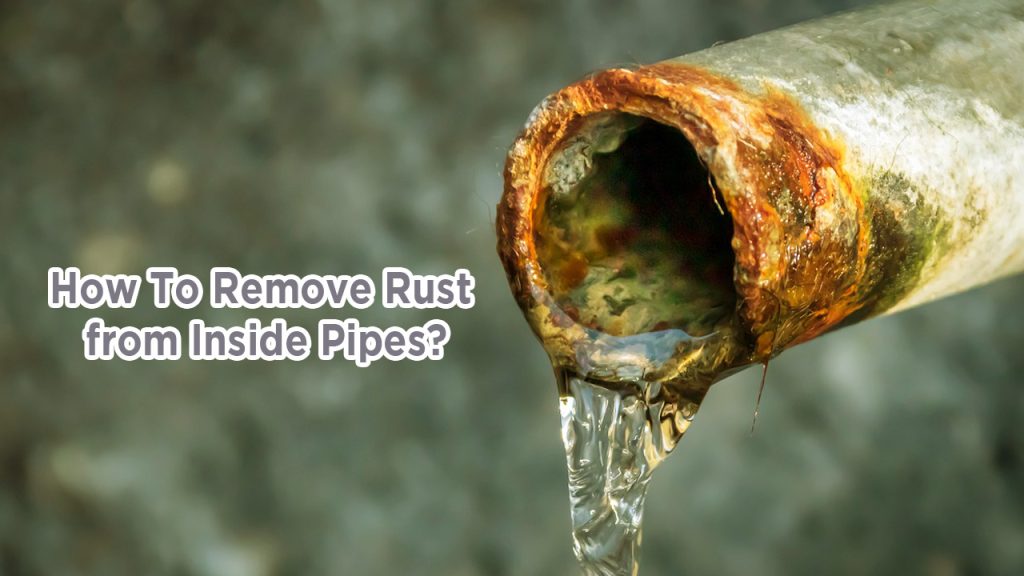How To Remove Rust from Inside Pipes?
Are you struggling with rusty pipes that are affecting the water quality in your home? Don’t let corroded pipes dampen your plumbing system’s performance. We will guide you on how to effectively remove rust from inside pipes, restoring them to their optimal condition.

Photo by analogicus on Pixabay
Rust can accumulate over time due to various factors such as age, poor water quality, or high levels of humidity. It can lead to clogged pipes, reduced water flow, and even leaks if left untreated. With the right techniques and tools, you can say goodbye to rust and enjoy clean, clear water once again.
Dangers of Rust in Pipes
Rust is not just an unsightly nuisance; it can have serious consequences for your plumbing system. When rust forms inside pipes, it can cause blockages and restrict the flow of water. This can lead to low water pressure, making it difficult to perform everyday tasks like showering or washing dishes. Rust particles can contaminate the water supply, affecting its taste and quality.
In some cases, prolonged exposure to rust-contaminated water can even pose health risks. It’s crucial to address rust in pipes promptly to avoid further damage to your plumbing system and maintain a healthy water supply.
Signs of Rust in Pipes
Detecting rust in pipes is essential for timely intervention. There are several signs that indicate the presence of rust in your plumbing system. One common indicator is discolored water. If you notice brown or orange water coming out of your taps, it’s likely that rust is present.
Another sign is a metallic taste or a foul odor in the water. If you observe a decrease in water pressure or notice leaks in your pipes, it could be due to rust buildup. Regular inspection and vigilance are key to catching rust in pipes early on and preventing further damage.
You might also be interested in: Element that Makes Plumbing Pipes
Causes of Rust in Pipes
To effectively remove rust from inside pipes, it’s important to understand the causes of its formation. Rust occurs when iron or steel pipes are exposed to oxygen and moisture. These elements combine to form iron oxide, commonly known as rust. Factors such as age, poor water quality, and high humidity levels can accelerate the rusting process. Older pipes are particularly vulnerable to rust, as they may have been in use for decades.
If your water supply contains high levels of minerals or has a low pH, it can corrode the pipes and promote rust formation. Similarly, humid environments provide the ideal conditions for rust to thrive.
By identifying the underlying causes of rust, you can take appropriate measures to remove it and prevent future occurrences.
You might also be interested in: What Does a Plumber do on Daily Basis? Inside the Life of a Plumbing Pro
Prevention Methods for Rust in Pipes
Prevention is always better than cure, and this holds true for rust in pipes. By implementing a few preventive measures, you can minimize the risk of rust formation and extend the lifespan of your plumbing system.
One effective method is installing a water softener or a whole-house water filtration system. These devices can remove minerals and impurities from the water supply, reducing the chances of pipe corrosion.
Regularly cleaning your pipes and flushing them with clean water can also help prevent rust buildup. Insulating pipes in areas with high humidity levels can prevent condensation and minimize the risk of rust. By taking proactive steps, you can keep your pipes rust-free and ensure a steady flow of clean water throughout your home.
Here’s another post you might find useful: Are Culligan Water Systems Worth It
DIY Methods to Remove Rust from Inside Pipes
If you’re dealing with rust in your pipes, there are several do-it-yourself (DIY) methods you can try before resorting to professional assistance. One common DIY solution is the use of white vinegar. Vinegar’s acidic properties make it effective in dissolving rust. To use this method, you’ll need to drain the affected pipe and pour vinegar into it. Let it sit for a few hours or overnight, allowing the vinegar to break down the rust. Afterward, flush the pipe with clean water to remove any residual rust particles.
Another DIY option is to create a paste using baking soda and water. Apply the paste to the rusted areas and scrub gently with a brush. Rinse the pipe thoroughly to remove the paste and any loosened rust. These DIY methods can be cost-effective and environmentally friendly alternatives to commercial rust removers.
Professional Solutions for Removing Rust from Inside Pipes
If the DIY methods don’t yield the desired results or if you’re dealing with severe rust buildup, it may be necessary to seek professional assistance. Plumbers have access to specialized tools and equipment that can effectively remove rust from inside pipes.
One common method used by professionals is hydro jetting. This involves using high-pressure water to blast away rust and debris, restoring the pipe’s functionality.
Another professional solution is chemical rust removers. These products are specifically formulated to dissolve rust and are highly effective in restoring pipes to their optimal condition. When opting for professional solutions, it’s important to hire a licensed and experienced plumber who can assess the extent of the rust damage and recommend the most suitable course of action.
Maintenance Tips to Prevent Future Rust in Pipes
Once you’ve successfully removed rust from inside your pipes, it’s crucial to implement proper maintenance practices to prevent its recurrence. Regularly inspecting your pipes for any signs of rust or corrosion is essential. If you notice any issues, address them promptly to prevent further damage. Flushing your pipes regularly with clean water can help remove any accumulated debris and prevent rust buildup.
Additionally, consider installing a corrosion-resistant coating on your pipes to provide an extra layer of protection. Proper insulation in areas prone to high humidity levels can also help prevent condensation and minimize the risk of rust formation. By incorporating these maintenance tips into your routine, you can ensure the longevity and efficiency of your plumbing system.
Importance of Regular Pipe Inspections
To maintain a rust-free plumbing system, it’s crucial to schedule regular pipe inspections. Professional plumbers can conduct comprehensive inspections to identify any signs of rust or corrosion. They have the expertise to detect even minor issues that may go unnoticed by the untrained eye. Regular inspections allow for early intervention, preventing rust from spreading and causing further damage to your pipes.
Plumbers can assess the overall health of your plumbing system and provide recommendations for maintenance or upgrades. By investing in regular pipe inspections, you can stay one step ahead of rust and ensure the longevity and reliability of your plumbing system.
Conclusion
Rust in pipes is a common problem that can compromise the performance and safety of your plumbing system. With the right techniques and preventive measures, you can effectively remove rust from inside pipes. From DIY methods using vinegar or baking soda to professional solutions like hydro jetting or chemical rust removers, there are various options to choose from.
By implementing regular maintenance practices and scheduling professional inspections, you can prevent future rust formation and maintain a clean and healthy water supply in your home. Don’t let rusty pipes dampen your plumbing system’s integrity. Take action today to remove rust and enjoy the benefits of a well-functioning plumbing system.


